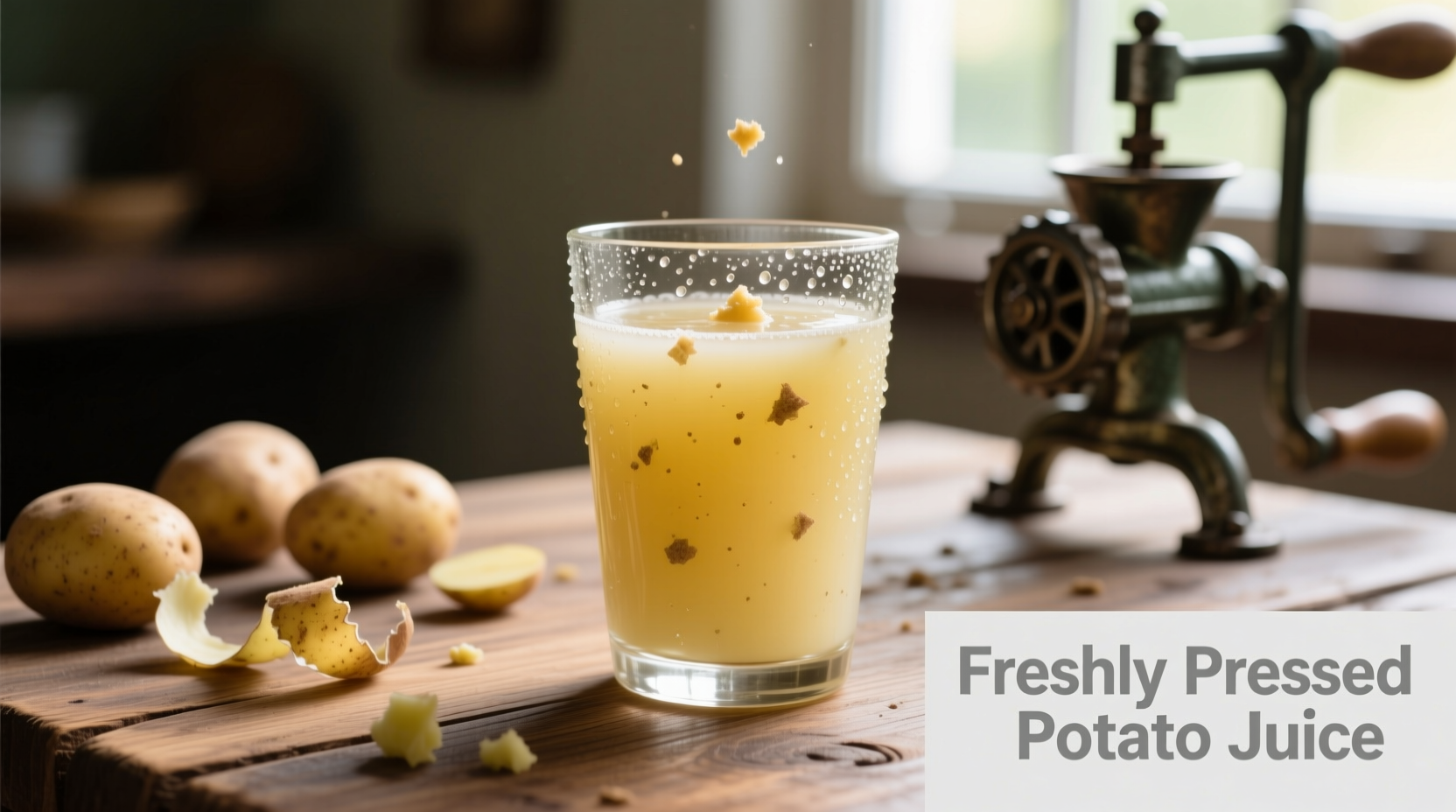Curious about the health claims surrounding potato juice? You're not alone. Many wellness blogs tout raw potato juice as a miracle remedy for digestion, inflammation, and skin health. But what does science actually say? This evidence-based guide separates fact from fiction, helping you make informed decisions about incorporating potato juice into your routine.
What Exactly Is Potato Juice?
Potato juice is the liquid extracted from raw potatoes through grating and pressing. Unlike cooked potato dishes, this preparation method preserves certain heat-sensitive compounds but also retains naturally occurring substances like solanine—particularly in green or sprouted potatoes.
Historically, some traditional medicine systems have used potato juice for digestive complaints. In Irish folk medicine, it was sometimes recommended for stomach ulcers, while Russian home remedies occasionally suggested it for skin conditions. However, these traditional uses haven't been consistently validated by modern research.
| Common Claim | Scientific Evidence | Expert Assessment |
|---|---|---|
| "Cures stomach ulcers" | No clinical trials support this; some animal studies show modest protective effects | Unproven for human treatment; consult gastroenterologist for ulcers |
| "Reduces inflammation" | Limited test-tube studies show antioxidant activity | Insufficient evidence for therapeutic use; not comparable to proven anti-inflammatories |
| "Detoxifies the body" | No scientific basis; kidneys and liver handle detoxification | Marketing term without physiological evidence |
Potential Benefits: What Research Actually Shows
Potatoes contain vitamin C, potassium, and certain antioxidants like chlorogenic acid. A 2018 review in Nutrients noted that potato compounds demonstrated antioxidant activity in laboratory settings, but emphasized that these findings don't translate directly to health benefits in humans.
The most plausible benefit relates to hydration and minor nutrient supplementation. One cup (240ml) of raw potato juice provides approximately:
- 20-30mg of vitamin C (30-50% of daily needs)
- 400-500mg of potassium
- Trace amounts of B vitamins
However, you'd obtain these same nutrients more safely from cooked potatoes or other vegetables without the potential drawbacks of raw consumption.
Important Safety Considerations
Raw potatoes contain glycoalkaloids like solanine and chaconine, which protect the plant but can cause issues in humans. According to the U.S. Food and Drug Administration, concentrations above 20mg/100g can cause digestive upset. Green or sprouted potatoes contain significantly higher levels.
Common side effects of drinking raw potato juice include:
- Nausea or stomach cramps (especially in sensitive individuals)
- Heartburn or acid reflux
- Headaches in some people
- Potential interactions with certain medications
People with irritable bowel syndrome (IBS) or inflammatory bowel disease (IBD) should be particularly cautious, as raw potato compounds might exacerbate symptoms. The Crohn's & Colitis Foundation recommends avoiding raw potato products during flare-ups.

How to Prepare Potato Juice Safely (If You Choose To)
If you decide to try potato juice despite the limited evidence, follow these safety guidelines:
- Use only firm, blemish-free potatoes with no green discoloration
- Peel thoroughly to reduce glycoalkaloid content (concentrated near skin)
- Wash potatoes well before preparation
- Use immediately after preparation (nutrients degrade quickly)
- Start with small amounts (1-2 tablespoons) to assess tolerance
- Discard if you notice any bitterness (indicates higher solanine)
Never use green, sprouted, or damaged potatoes. The National Institute of Diabetes and Digestive and Kidney Diseases recommends consulting your physician before trying any new dietary practice, especially if you have existing health conditions.
When Potato Juice Might Be Appropriate (And When To Avoid)
Based on current evidence, potato juice might be considered in limited circumstances:
- Short-term use: For no more than 3-5 days as part of a broader dietary approach
- As a hydration supplement: When added to other vegetable juices in small proportions
- For culinary experimentation: As a minor ingredient in cold soups or dressings
Avoid potato juice if you:
- Have digestive disorders like IBS or IBD
- Take medications for heart conditions or blood pressure
- Are pregnant or breastfeeding
- Have kidney problems (due to potassium content)
Healthier Alternatives With Stronger Evidence
Instead of focusing on unproven potato juice benefits, consider these evidence-backed options:
- For digestion: Fermented foods like sauerkraut or kefir (supported by multiple clinical studies)
- For inflammation: Tart cherry juice (shown effective in randomized controlled trials)
- For skin health: Carrot or tomato juice (rich in beta-carotene and lycopene with established benefits)
Remember that whole foods generally provide more balanced nutrition than isolated juices. The Dietary Guidelines for Americans consistently emphasize consuming vegetables in their whole form whenever possible.
Consult Your Healthcare Provider First
Before trying potato juice or any new dietary practice, discuss it with your doctor or registered dietitian. This is especially important if you have:
- Diabetes (potatoes affect blood sugar)
- Kidney disease (potassium concerns)
- Autoimmune conditions
- Are taking medications like blood thinners
Your healthcare provider can help you weigh potential benefits against risks based on your individual health profile. They can also suggest evidence-based alternatives that better match your health goals.
Does drinking potato juice really help with stomach ulcers?
No strong scientific evidence supports potato juice as an effective ulcer treatment. While some historical traditions used it for digestive issues, modern research shows limited benefits. The American College of Gastroenterology recommends evidence-based treatments like proton pump inhibitors rather than unproven remedies for ulcers.
How much potato juice is safe to drink daily?
There's no established safe amount due to lack of research. If trying it, start with 1-2 tablespoons daily and monitor for side effects. The National Institutes of Health advises against regular consumption of raw potato products because of potential glycoalkaloid exposure, especially for children and pregnant women.
Can potato juice help with acid reflux?
Actually, potato juice may worsen acid reflux for many people. The International Foundation for Gastrointestinal Disorders notes that raw potato compounds can increase stomach acid production in sensitive individuals. Cooked potatoes are generally better tolerated for those with GERD.
Does potato juice contain harmful substances?
Yes, raw potatoes contain natural compounds called glycoalkaloids (solanine and chaconine). In high amounts, these can cause digestive upset, headaches, or neurological symptoms. The FDA considers concentrations above 20mg/100g potentially harmful. Green or sprouted potatoes contain significantly higher levels and should never be used for juice.
Is potato juice good for skin health?
There's minimal evidence supporting potato juice for skin health. While potatoes contain vitamin C important for collagen production, you'd get more consistent benefits from established sources like citrus fruits or bell peppers. The American Academy of Dermatology recommends evidence-based approaches like sunscreen and proven topical treatments rather than unverified dietary remedies for skin concerns.











 浙公网安备
33010002000092号
浙公网安备
33010002000092号 浙B2-20120091-4
浙B2-20120091-4